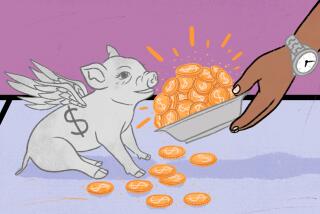Investors Forecast Unreal 401(k) Gains
- Share via
Two straight years of stock market losses have left America’s 401(k) retirement savers with muted expectations for 2002, but in many cases their longer-term forecasts remain wildly optimistic, according to a new survey.
The November poll of 500 participants in 401(k) plans, to be released this week by No. 2 mutual fund provider Vanguard Group, found that respondents expect an average 7% annual return on stocks over the next year or two. It’s the first time a national survey has found 401(k) investors expecting less than double-digit returns on their accounts, according to Vanguard.
But many savers still have a rosy long-term view of the market, the poll found. Nearly one-fourth of respondents expect stock prices to rise 30% to 100% a year over the next two decades--in line with the results of public-opinion surveys from the height of the late-1990s bull market. Even the respondents’ median forecast of 15% annual gains is well above historical stock market returns, which have averaged 10.7% a year since 1926. (Median means half the forecasts were higher and half were lower.)
Experts say the optimistic responses indicate that, for some investors, the euphoria of the bull market that crashed in the spring of 2000 still lingers.
“There’s some recognition of how tough the current market environment has been,” said Barbara Fallon-Walsh, a Vanguard principal who oversees the firm’s 401(k) education programs. “But longer term, it might be that hope springs eternal.”
Still, she said she was encouraged by investors’ “reasonable” near-term expectations, by the fact that most savers have stayed the course in a rough environment for stocks and that many recognize the need to save more money to meet their goals.
Only 15% of respondents reported making a 401(k) portfolio change in the last six months. Twenty-two percent said they intend to contribute a higher portion of pay in the next six months, compared with 12% who raised their savings rate in the previous six months.
When it comes to long-term expectations for stock prices, several prominent professional investors have issued far tamer forecasts than those recorded by Vanguard’s pollsters.
Billionaire Warren Buffett, for example, said investors should be happy with 7% to 8% annual returns over the next decade. New York-based Standard & Poor’s Corp. predicts returns of 6% to 7% a year over the next five to 10 years, and Roger Ibbotson, head of Chicago investment research firm Ibbotson Associates, expects gains averaging 9.4% over the next 20 years.
That’s a far cry from the 20%-plus annual gains investors came to expect during the 1990s. The pros cite several reasons for their conservative expectations, including the fact that stocks are still pricey by historical standards.
Vanguard’s survey also found that investors’ expectations for bonds and money market funds are modest for the near term, but unrealistically buoyant over the long haul. Respondents expect annual returns of 7% for bonds and 4% for ultra-safe money markets over the next year or two--close to historical averages. But over the next decade or two, the median forecast is for 10% annual gains for both asset classes, while the average forecast, skewed by the extreme optimists, calls for 15% returns for bonds and 16% for money markets.
So-called defined contribution retirement plans, including 401(k)s, allow workers to save for retirement by investing tax-deferred income through a menu of investment options that typically includes stock and bond mutual funds, their employer’s company stock and a money market fund. More than 40 million Americans take part in the plans.
The hazards of owning company stock in a 401(k) account is poorly understood, according to Vanguard’s analysis. Respondents rated company stock as less risky than stock mutual funds, which experts consider much safer because of their diversified holdings. But respondents correctly identified individual stock in general as riskier than stock funds.
“There are analogies in other areas, such as people’s [often negative] perceptions of stock brokers and politicians,” Fallon-Walsh said. “It’s the attitude that ‘mine is different.’ It’s the comfort of the known.”
Thousands of 401(k) savers at companies such as Enron Corp. and Lucent Technologies Inc. have seen their retirement savings crumble in the last two years because they invested too much in company stock. Many financial planners say workers shouldn’t put more than 5% of their 401(k) holdings in their employer’s stock, especially since their paycheck is also tied to the company’s fortunes.
The unrealistic long-term expectations of many, and the misperceptions of relative risk, point to the importance of 401(k) education programs, Fallon-Walsh said.
“Between all the Web sites, company meetings with employees and the printed materials available, the table is set. It’s just a question of getting people to sit down and eat the dinner.”
More to Read
Inside the business of entertainment
The Wide Shot brings you news, analysis and insights on everything from streaming wars to production — and what it all means for the future.
You may occasionally receive promotional content from the Los Angeles Times.










